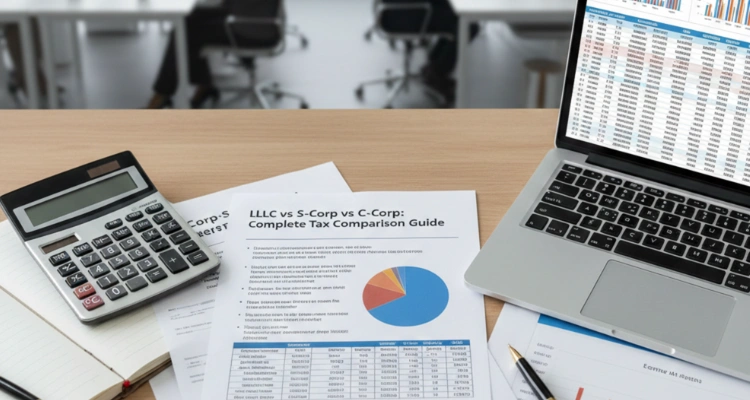The average real estate agent overpays $3,000 to $8,000 in taxes annually by missing legitimate business deductions. If you're a successful agent who closed dozens of deals last year but still felt the tax burden, you're likely overlooking significant savings opportunities.
Real estate professionals operate as independent contractors with unique tax advantages that many fail to fully utilize. Unlike traditional employees, agents can deduct a wide range of business expenses that directly reduce taxable income.
Why 2025 matters for your tax strategy: The Qualified Business Income (QBI) deduction remains in effect, allowing eligible agents to deduct up to 20% of qualified business income. Combined with updated mileage rates and extended meal deduction provisions, 2025 presents exceptional opportunities for tax optimization.
Top 4 Essential Business Expense Categories in 2025
These fundamental deduction categories form the backbone of every real estate agent's tax strategy. Missing these means leaving substantial money on the table.
1. Vehicle & Travel Expense Deductions
Vehicle expenses are the largest deduction opportunity for most real estate agents. The IRS offers two methods—track both to maximize benefits.
2025 mileage deduction options:
1. Standard rate: 70 cents per mile (up from 67 cents in 2024)
2. Actual expense method: Track all vehicle costs and deduct business percentage
Additional deductible expenses:
1. Parking fees and tolls for client meetings
2. Car maintenance and repairs (business portion)
3. Public transportation and ride-share costs
4. Business travel for out-of-area deals
Quick calculation: Average agents drive 15,000 business miles annually. At 70 cents per mile, that's $10,500 in deductions.
2. Marketing & Advertising Deductions
Every marketing dollar spent reduces taxable income dollar-for-dollar. Real estate marketing expenses have expanded significantly in the digital age.
Fully deductible marketing costs:
- Website development, hosting, and CRM subscriptions
- Online ads (Google, Facebook, Zillow Premier Agent)
- Professional photography and videography
- Business cards, flyers, yard signs, promotional materials
- Client gifts (limited to $25 per person annually)
- Open house expenses including food and decorations
Technology costs like virtual tour software, lead generation platforms, and social media tools are completely deductible as necessary business expenses.
3. Professional Development & Licensing Deductions
All training that maintains or improves real estate skills qualifies for tax write-offs beyond basic requirements.
Fully deductible professional expenses:
- Real estate license renewal fees
- MLS dues and Realtor association fees (NAR, state, local)
- Continuing education courses and certifications
- Real estate conferences, seminars, workshops
- Travel expenses for professional development
Professional growth investments provide immediate tax benefits while building long-term earning potential.
4. Office & Technology Deductions
Modern real estate requires significant technology investments that qualify for complete deductibility when used for business.
Essential deductible expenses:
- Office supplies (paper, printer ink, equipment)
- Software subscriptions (CRM, e-signature, transaction management)
- Phone and internet expenses (business portion only)
- Professional services (legal, accounting, virtual assistant fees)
Equipment like computers, tablets, and phones used primarily for business can be deducted immediately using Section 179 provisions or depreciated over time.
Need help tracking business expenses? Explore our monthly accounting services designed specifically for real estate professionals.
Top Overlooked Tax Deductions for Real Estate Agents in 2025
These hidden opportunities often represent thousands in missed savings because many agents and generic tax preparers don't understand real estate-specific deductions.
1. Home Office Deduction
C-Corporations pay a flat 21% federal tax rate on all taxable income in 2025.
Agents using part of their home exclusively for business can claim substantial savings. Two calculation methods exist—choose the one providing larger benefits.
Simplified method:
- $5 per square foot of home office space
- Maximum 300 square feet ($1,500 maximum deduction)
- Easier record-keeping with no depreciation recapture
Actual expense method:
- Deduct business percentage of actual home expenses
- Includes mortgage interest, property taxes, utilities, insurance, repairs
- Often provides larger deductions for expensive homes
Strict eligibility: Space must be used exclusively for business and serve as your principal place of business or regular client meeting place.
2. Brokerage & Desk Fee Deductions
All fees paid to your brokerage are fully deductible business expenses that many agents overlook or incorrectly categorize.
Deductible brokerage expenses:
- Monthly or annual desk fees
- Transaction fees charged per deal
- Technology fees for brokerage systems
- Errors & Omissions (E&O) insurance premiums
- Administrative support fees
These fees often total thousands annually and represent dollar-for-dollar reductions in taxable income when properly documented.
3. Health Insurance Premium Deductions
Self-employed real estate agents can deduct 100% of health insurance premiums paid for themselves, spouses, and dependents under specific conditions.
Eligibility requirements:
- Must be self-employed with no employer health plan access
- Business must show profit for the tax year
- Cannot exceed net self-employment income
This deduction appears on Form 1040 rather than Schedule C, providing tax benefits even without itemizing other deductions.
4. Retirement Contribution Deductions
- Self-employed agents access powerful retirement savings options that provide immediate tax deductions while building long-term wealth.
- SEP-IRA contributions: Up to 25% of net self-employment income or $70,000 (2025 limit), whichever is less.
- Solo 401(k) options: Higher contribution limits allowing both employee and employer contributions up to $70,000 annually (plus catch-up contributions for those 50+).
5. Qualified Business Income (QBI) Deduction
The QBI deduction allows eligible agents to deduct up to 20% of qualified business income—one of the most significant tax benefits available.
2025 QBI deduction rules:
- Applies to pass-through business income (sole proprietorship, partnership, S-Corp)
- Full deduction for single filers under $191,050 ($382,100 married filing jointly)
- Phaseout occurs above these thresholds with elimination at higher income levels
This deduction can save thousands annually for qualifying agents and emphasizes the importance of proper business structure planning.
Ready to maximize your deductions? Contact Virtue CPAs today for a personalized tax strategy consultation.
What Expenses Real Estate Agents Can’t Deduct in 2025?
Understanding deduction limitations prevents costly audit triggers and ensures full IRS compliance.
1. Personal Expenses Are Never Deductible
Clear boundaries between personal and business expenses protect you from audit scrutiny and potential penalties.
Never deductible personal expenses:
- Commuting costs from home to primary office
- Personal phone bills and regular business clothing
- Personal meals, entertainment, and family activities
- Personal vehicle payments (only business use percentage qualifies)
Mixed-use expenses require careful allocation between personal and business use with detailed documentation supporting business percentages.
2. Capital vs. Operating Expenses
Capital expenses must be depreciated over time rather than fully deducted in the purchase year, affecting cash flow and tax planning.
Capital expenses requiring depreciation:
- Major equipment purchases (vehicles, expensive computers)
- Home improvements that increase property value
- Furniture and fixtures with useful lives exceeding one year
Operating expenses fully deductible immediately:
- Repairs maintaining current condition without improvement
- Software subscriptions and monthly service fees
- Supplies consumed within the tax year
Understanding this distinction helps agents plan major purchases strategically to optimize tax benefits across multiple years.
3. Illegal Payments and Fines
Any illegal payments, bribes, or fines are never deductible regardless of business connection. This includes parking tickets, speeding fines, and payments violating local, state, or federal laws.
What Tax Forms and Documents Do Real Estate Agents Need in 2025?
Proper documentation and form filing ensure maximum deductions while maintaining audit-proof records for IRS compliance.
Key Forms Real Estate Agents Must File
- Schedule C (Form 1040): Profit or Loss from Business—primary form for reporting real estate business income and expenses.
- Form 8829: Expenses for Business Use of Your Home—required when claiming home office deduction using actual expense method.
- Form 1099-NEC: Nonemployee Compensation—received from brokerages and clients for commission payments exceeding $600.
Additional forms may include quarterly estimated tax payments (Form 1040ES) and various state and local tax compliance documents.
What Record-Keeping Best Practices Should Agents Follow?
Meticulous record-keeping provides audit protection and ensures you capture every eligible deduction throughout the year.
Essential documentation:
- All receipts for business expenses with dates and business purposes
- Detailed mileage logs with destinations and business justifications
- Bank statements for dedicated business accounts
- Commission statements and 1099 forms from all sources
Recommended digital tracking tools:
- QuickBooks Self-Employed for comprehensive expense management
- Expensify for receipt capture and categorization
- MileIQ for automatic mileage tracking
- Receipt Bank for document storage and organization
2024 vs 2025 Tax Deduction Comparison
| Deduction Category | 2024 Rates/Limits | 2025 Rates/Limits | Potential Annual Savings |
|---|---|---|---|
| Standard Mileage Rate | 67¢ per mile | 70¢ per mile | $450 (15,000 miles) |
| QBI Deduction Threshold | Single: $182,050 | Single: $191,050 | Up to 20% of income |
| SEP-IRA Contribution | $69,000 max | $70,000 max | $220+ tax savings |
| Home Office (Simplified) | $1,500 max | $1,500 max | $330-$495* |
| Client Gifts | $25 per person | $25 per person | Varies by clients |
| Business Meals | 100% (temporary) | 100% (extended) | $500-$2,000 |
*Savings based on 22-33% tax bracket
Top Strategies to Reduce Taxable Income in 2025
Strategic tax planning throughout the year maximizes deductions while minimizing year-end scrambling and missed opportunities.
1. Track Every Business Expense
Daily expense tracking captures deductions that accumulate significantly over a full tax year.
Implementation strategies:
- Use smartphone apps to photograph receipts immediately
- Maintain separate business credit cards and bank accounts
- Set weekly reminders to log mileage and expenses
- Review and categorize expenses monthly
Consistent tracking prevents forgotten deductions and provides clean records for tax preparation and potential audits.
2. S-Corp Election Benefits
S-Corp election can save thousands in self-employment taxes for higher-income agents but requires careful analysis and professional guidance.
S-Corp benefits for qualifying agents:
- Potential savings on self-employment taxes
- Ability to pay reasonable salary and take distributions
- Maintained business flexibility with tax advantages
Consider S-Corp election when:
- Net business income consistently exceeds $60,000 annually
- Income patterns remain relatively stable
- You can commit to payroll and additional compliance requirements
3. Quarterly Estimated Tax Payments
Quarterly estimated payments prevent underpayment penalties and help manage cash flow throughout the year rather than facing large tax bills in April.
Payment calculation guidelines:
- Pay 25-30% of net income quarterly
- Adjust estimates based on actual earnings and deduction strategies
- Use previous year's tax liability as safe harbor when income varies
Stop Leaving Money on the Table: Your Next Steps
The average real estate agent who implements these strategies saves $3,000 to $8,000 annually. That's money already sitting in your business—you just need to know how to claim it legally and properly.
Every month you wait costs you money. While you're reading this, deductible expenses are accumulating. Vehicle miles, marketing costs, professional development, and office expenses add up quickly. Without proper tracking and strategy, these become missed opportunities.
The difference between struggling agents and thriving agents isn't just sales volume—it's smart tax planning. Successful agents understand that keeping more of what they earn is just as important as earning more commission.
Don't wait until the next tax season to start saving. The strategies outlined in this guide work best when implemented consistently throughout the year. Every day you delay is money left on the table.
Ready to take control of your taxes and grow your bottom line?
Contact Virtue CPAs today for a personalized tax strategy tailored for real estate professionals.
Virtue CPAs specializes in real estate professional taxation, helping agents optimize their tax strategies through comprehensive business tax services and year-round planning.
Frequently Asked Questions







